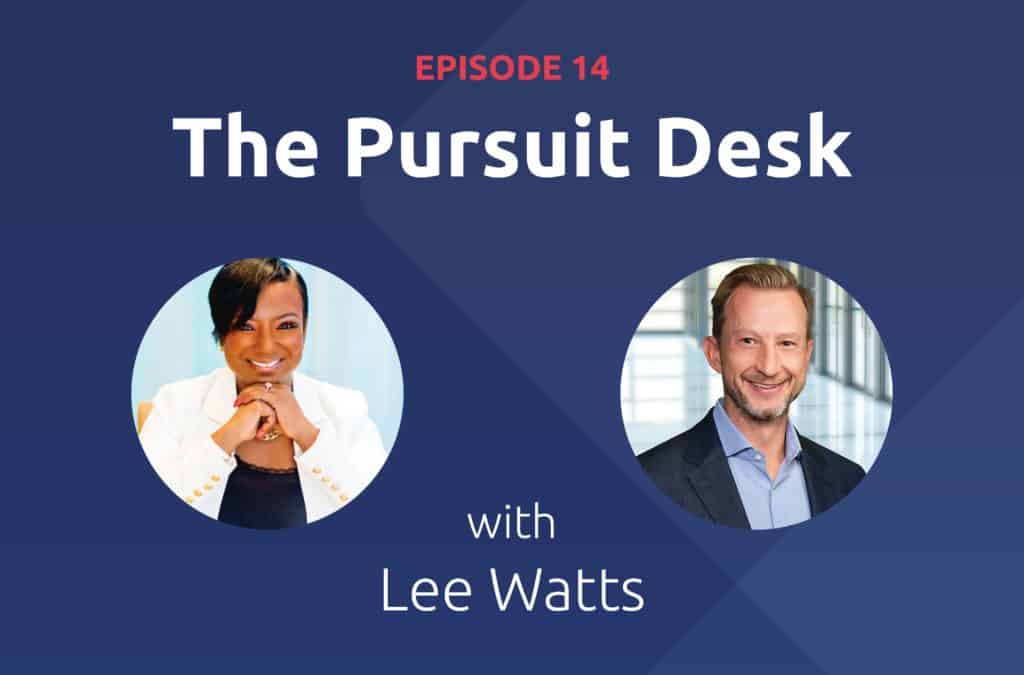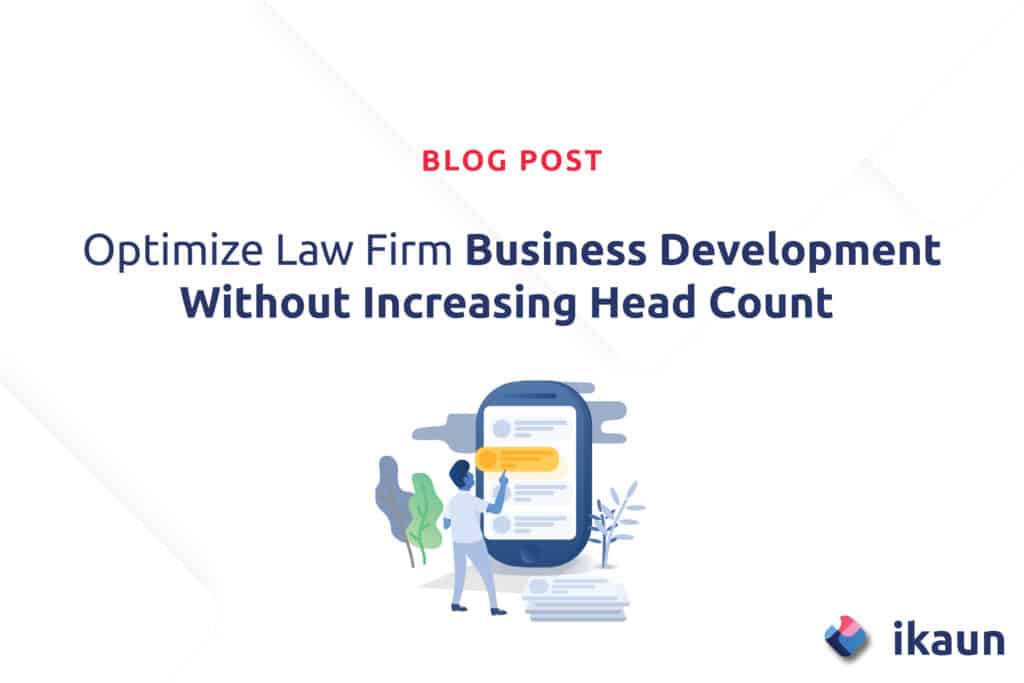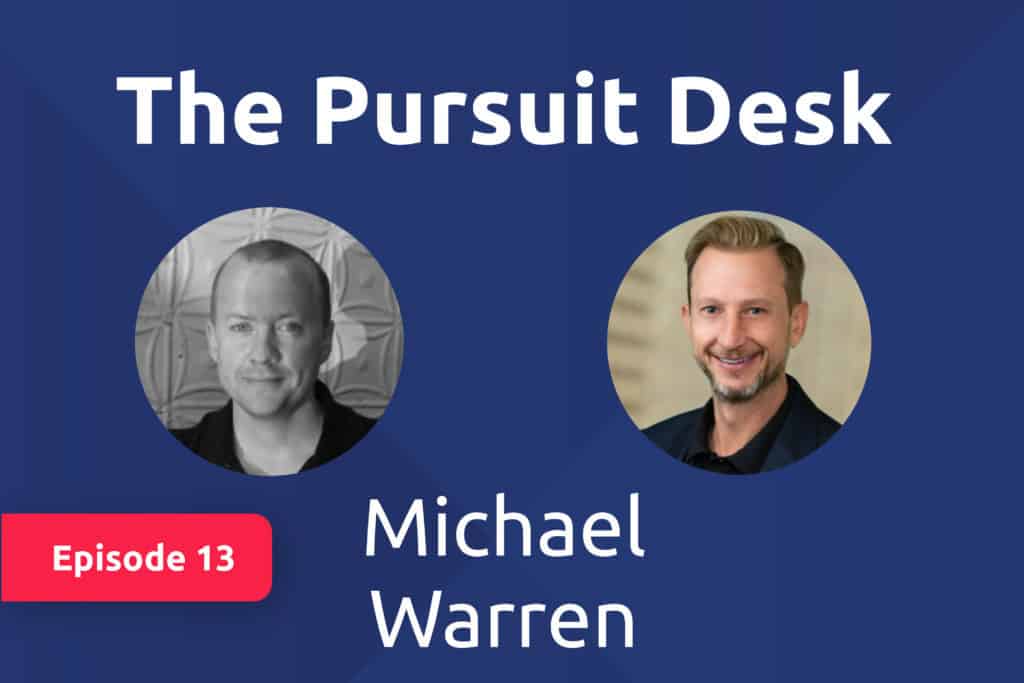This week’s episode of The Pursuit Desk features Clinton Gary, Chief Strategy and Business Development Officer and Burr & Forman LLP joins Jason Noble to discuss leveraging a firm’s experience to drive growth and firm efficiencies.
Clinton started in a traditional business consulting role at Arthur Anderson before moving to work in legal professional services. His role has always been based around information and being able to answer questions when professionals need to know what they have done and their previous experiences.
Connect with Burr and Forman Here
Subscribe links
1:40 Clinton’s experience starting in professional services.
Clinton started his career consulting at Arthur Anderson, one of the world’s biggest professional services firms.
He quickly moved into marketing as a market analyst, where he was tasked with understanding these questions:
- What have we done?
- What do we know?
- What do we know about our people who know about a particular issue?
- What do we know about a client or company?
2:38 Transitioning knowledge from professionals to experience management using the infrastructure.
Over time, the questions (above) he was tasked with answering lead him into an experience management role, talking directly to the professional.
His new mission then became… how can we manage an infrastructure to better respond to experience questions?
The new role provided Clinton the insight that the better a firm proactively manages its knowledge, making it accessible to everyone in the organization, the more you are allowing great marketing, business development, and collaboration to happen.
Ultimately, marketing and business development can only happen as well as a firm manages its knowledge. Otherwise, you are just a collection of individuals.
When you effectively manage knowledge, every individual is given the power to bring that knowledge to a professional or a client, which is the value he always strives to deliver.
4:21 The importance of auditing experience management systems.
The first thing Clinton does when he starts working at a firm is conduct a full audit of their experience management systems. He does this to get a better understanding of how and where they are managing their knowledge.
With this understanding, he can set expectations for his marketing team and action items that they can deliver to the attorneys. The first objective they set out to achieve is creating a knowledge management and experience management strategy for the firm, which includes a strategy for the people, processes, and the technology used.
Clinton has developed a personal formula based on the trends he’s seen in firms he has worked with: As well as a firm manages its relationships and experience is how well it can create opportunities and grow revenue.
Here are some questions you need to know the answers to that will directly impact firm growth:
- How well can a firm manage its client knowledge?
- What industries are they in?
- What is their location?
- What issues are they having?
- What is everything you know about your clients?
- What have you done for them?
- What were the results?
6:00 Experience management’s role in retention and the importance of talent.
One of the benefits of a well working experience management machine is that you ramp up your new talent faster.
Imagine being a new associate and being able to do simple searches from their desk that taps into all of the knowledge in the entire firm, no matter who did it or where they were located.
It levels the playing field. It gets rid of silos and puts the power in the hands of all the Partners and Associates.
A mature experience management system means everyone at the firm has access to all of the best knowledge at their firm. What you do with it is up to you, but you should at least have access to the knowledge your firm holds.
7:12 The better you understand your past, the better you stack up against your competitors.
When it comes to what matters at a law firm, where does the rubber meet the road?
Clinton believes the rubber meets the road when a partner can turn to their business development or marketing team and say, “I have an opportunity, and I need to send my client a PDF today on how we have solved this issue in the past.”
The question is the same one you will find repeatedly, and asks these two questions:
- Have you solved my problem?
- Have you solved it for a company or person like me?
Getting to that result where you beat out your competition, is with better people, processes, and better technology. There is a strategic objective to empowering a firm to share knowledge easily, and that’s the importance of what law firms are asking for today.
9:50 How do you become a strategic partner to practicing attorneys?
There’s a story that Clinton tells everyone who joins his team about a time when he walked into a Partner’s office, sat down, and had a long conversation about what he could do for them on a particular project.
The lawyer told him, “you just cost me about $200.” This immediately put their time into perspective for Clinton, and the importance of that time and their efficiency.
And he realized that there is a tremendous benefit to being able to make their life easier while understanding that time is the finite resource they’re fighting against. Every attorney and partner is facing time pulling questions from different departments, HR, Finance, and Marketing.
Whenever you need something, always have a good reason and purpose before going to talk to an attorney. They have to be able to add value to their conversations with attorneys. This applies even with an email that attorneys are copied on.
When experience is buried in the heads of your attorneys, you can’t be unorganized with your effort to capture it.
12:30 Marshalling the resources of people, processes, and technology to make it easy for attorneys to participate.
It’s important to understand that attorney’s time is sensitive and valuable, and however much time you ask of an attorney, you have to be able to give them back that time or even more. If you take 15 minutes of their time you have to be able to save them that amount of time or more to make it valuable to them.
There is a phrase that Clinton repeats to his team, “common methodologies create common vocabularies, which improved efficiency and expectations.” It means that Clinton and his team always try to avoid doing anything that is a one-off effort. Establishing a common methodology for approaching each project is critical to building efficiency.
That’s important because knowledge management is about common methodologies and common vocabularies.
15:00 Building methodology that is not wasting an attorney’s billable time.
Operating on a consistent methodology will save time for everyone at the firm. Clinton believes that the best way that you can determine if you are providing value to the attorneys is if there is this “Aha moment.”
This moment is when a teammate is talking to an attorney, and they realize the value that you are bringing to the table. The moment that you make the attorney think, “I’m glad you said that to me.”
This can be in both human form and digital form. You need to be providing them with information about things they did not already know or understand. These common methodologies create an environment where everyone can collaborate on projects well together.
Common methodologies make things easier and create common vocabularies and are one of the most important things you should invest your time into if you are in legal marketing.
16:19 What are the initial goals of leveraging your past experience?
Everyone he has worked with did not have a preexisting structure in place to manage knowledge. Establishing a common line of thinking to ensure long term success is critical, which is why he introduces his core belief system beginning as early as the interview process.
His main core belief is the following: As well as you manage your knowledge is as well as the team can create more knowledge or increase the speed at which we can create new opportunities and revenue.
When Clinton has performed an experience (knowledge management) audit at any firm he has worked for he finds where the firm can grow to better meet the needs of their clients and customers. He does this by helping them create a more collaborative culture which leads to increased opportunities and revenue through knowledge management.
That’s where he starts when building out an experience management and knowledge management strategy. It’s not a short-term project either, it always has to be approached as an ongoing process and foundational block for the team moving forward.
Every day you need to wake up and have someone in the marketing department working on the knowledge that can enhance one of the items below. Leadership will also have the clarity and confidence knowing what marketing is working on at any given time because it aligns with one of these three things:
- Create a more collaborative culture – set expectations for why knowledge management is important: where are our people, places, and technology to manage knowledge?
- Increase opportunities and revenue – when a firm has growth plans, how quickly can it roll new knowledge into its current dataset?
- Increase investment into laterals – create an exponential factor of the investment you’re making into acquiring new law firm firms to add to the collective knowledge of the firm.
22:01 Dealing with the resistance to innovation in law firms, how does Clinton overcome detractors?
He has a bold vision for firms, and with bold visions, there is always resistance and non-believers to the benefits of change.
Clinton thinks about this problem in two ways:
- Prevent what you’re doing from being overwhelming to the attorney.
- Make what you want the attorney to do easily on a daily basis.
It boils down to projects vs. processes.
What is a project? Sit down and talk to leadership and attorneys to catch up to speed and gather up all your knowledge. Re-write stuff, capture it, find it, put it together, build systems.
What is a process? As new stuff is created, the machine identifies it, purges the old, puts in the new, and constantly reclassifies things.
The attorney understands the process but gets overwhelmed by the project. Imagine you sit down with a senior attorney with a diverse set of experiences, and you say, “I want you to tell me the 50 best experiences you’ve had over the last 30 years, with an emphasis on the last 10 years. Give me something significant, groundbreaking, innovative. Go noodle all that stuff and come back to me.”
The attorney will respond with, “you expect me to write all that stuff down? I should remember it? And write it down? That will take me weeks.”
Bring it in by saying, “what do you have in your bio, right now? Are you representing yourself well? Is your best stuff out there?”
In Clinton’s experience, 90% of the time the website bio has three bullets with very little content. This bio is probably being visited, on average, 100 – 300 times per month.
You need to create a library of “best-of’s” – a set of experiences that are your go-to for certain marketing situations. When you start collecting best-of experience from attorneys, you (the knowledge manager) will get better engagement, and they will start remembering every relevant experience.
It is a great way to work through an attorney’s career, and they can usually get the information you need in two or three passes. These passes are usually:
- The first time you ask and take them through the process.
- When you launch or refresh the website and they see it live out in the real world.
- When a big proposal comes in and they start to remember more records that weren’t mentioned.
What are the barriers? The professional’s anxiety to sit back and evaluate their career, thinking of the best things they’ve done.
What’s the issue in their head? They can’t delegate it. This is a tactical request that they cannot delegate.
How do you get them to build a “best-of” library?
- Ease their efforts on you would implement it
- Pound the “why”
- Tell them how it will be used and see it through and sustain the project
Once they understand the importance of having experience information easily accessible, attorneys will be more likely to help you maintain the knowledge and experience database on an on-going basis.
30:00 Why having a plan for the experience collection process is important.
A plan and a process are the two most important things you need to ensure your project will be adopted and sustained by leadership, attorneys, and your team.
The first questions you will get from leadership are:
- How are you going to capture the information?
- How are you going to keep it fresh?
Warning: A lot of law firms start an experience management project and fail to sustain it.
Don’t go bug attorneys if you can’t sustain the project. You must have a plan to choose and assign the right people, processes, and technology to make it easy for an attorney to capture knowledge.
When you’re beginning an experience management project, ask yourself:
- Are you choosing the right technology?
- Are you assigning the right people with clear responsibilities?
- Have you set the right expectations with every attorney, so that when a situation occurs, you have a responsibility to help us capture the knowledge that just occurred?
In other words, knowledge isn’t just a thing out there that happens at any time.
Break it down for the attorneys and leadership, when will this experience be used?
- In a proposal situation,
- when a matter reaches a certain point of significance,
- or when a matter closes.
Communicate this to the attorney: Any time those three points happen (above), stop, invest 30 minutes, and draft a description of marketing needs.
If you leave the process open-ended, you won’t get what you want. You have to create a process that is clear and makes it easy for attorneys to do what you want because they’re great at following processes.
One of the easiest ways to give an attorney confidence is to overcome their short- and long-term emotions. Make it clear what you’re asking for, and when you need it.
Most importantly, make it clear that their hard work helps them do their job.
Attorneys want to know that their hard work powers a team behind them that adds a layer of value, making their experience great. When you get the opportunity to capture knowledge, ensure that anything submitted to them is reviewed, tightened up, and sent back for approval.
Lawyers want value from the overhead cost that they pay for. Don’t ever send an attorney something where that is not at the highest quality. For example, misspellings will crush you, and you’ll face layers of bureaucracy before you’re allowed to send another thing out to the public.
The marketing team must ensure quality in anything related to experience, because of its confidentiality and its importance in representing an attorney’s practice.
34:19 How can you proactively work with attorneys to collect experience?
Lawyers have had to fast-track the adoption and use of technology in the last 10 years.
And a lot of this tech is not at the level of the consumer side of the technology market.
A lawyer can walk into an Apple store and buy an iPhone and understand it right away, but very few legal technologies are engaging and easy to use like consumer products we all use.
If you’re thinking about introducing legal tech, this is what to look for:
- It needs to be easy to use and understand.
- The platform should connect to other pieces of information, so it is a representation of what the attorney needs to accomplish the task.
- You must be able to go back to the technology and gain value from it. Many technology solutions, especially in the legal space, separate the value and the action, putting them in two different places.
Knowledge is a very quid pro quo area, what I put in…I better get out. I don’t want some link that goes out to an intranet with a bland form, where the attorney has no idea what they get out of it. An attorney should be able to submit information, turn around and do a search to see what they submitted and everything else like it.
It all goes back to the strategy. The attorney’s perspective is if you are going to ask me to do something, I need to be able to see the value that is equal to or greater than my effort. The value needs to be tangible.
To be clear, this is for marketing knowledge, not all of knowledge management. It’s about managing the stuff that makes marketing better in law firms.
40:25 What are the leadership qualities that help make technology initiatives successful?
Three words:
- Compelling
- Project Management
- Change Management
If you are championing an initiative that is going to use significant limited resources of the firm you must be able to create a compelling case in a large (group of Partners) and small (one on one) setting.
For people to trust and follow you, you need to be able to deliver a compelling message.
How can you become more compelling?
Learn and grow strong public speaking and communication skills to motivate and be able to be concise while getting the spirit and energy behind you to get a project off the ground.
What is the key to project management? Confidence.
Understand that you have certain levers, either limited by money, people, or other initiatives. Get a picture of those levers and communicate your plan to leverage them clearly to all stakeholders involved.
What are we trying to accomplish? When will it be finished? How much money will it cost? What other strategic initiatives will be impacted? Have you presented as best as possible a plan that gives your attorneys that it will be implemented?
This can be communicated with anything from charts to a written strategic vision.
Why should I consider “change” for my project?
Everyone has a plan until they get punched in the face. As soon as something goes wrong, how will you be able to adjust to meet expectations? How are you caring for your people, budget, economic downturns to maintain momentum? Do it in a way that is extremely caring and reasonable for your people.
Clinton reiterates, “Compelling, confidence, and change.”
45:04 Communicating the “why” to your team, attorneys, and leadership.
Know your people and team well. You may have people who are more brain dominant in these areas:
- Creative oriented
- Process-oriented
- Sales oriented
Some people will love this project and want more responsibility. Others won’t like it as much, as a leader, you’re responsible for identifying ways to put the right people on the right jobs. You want your team to be excited to wake up and do the things they were hired to do and do a little bit of the things they love to do.
If you can find the person on your team who “just gets it”, it will help the entire team find success.
Conan believes that public speaking skills and communication skills are very important in moving a significant project like this. Leadership needs to have energy and confidence in the project.
47:30 Conan’s perspectives on working with ikaun.
The people on his team know that he considers them his family. Any individual or vendor he brings on also becomes a part of his family. Because of that, he’s selective, and being a part of the family comes with honest conversations and dialogue.
Ikaun is part of his team and family and he treats Jason and the rest of the ikaun the same way he would anyone else.
What the ikaun team brings is incredible knowledge and experience in working with other world-class professional services firms out there to Clinton. He likes that they have one foot inside his organization, and another outside, giving him access to valuable knowledge and information he wouldn’t normally receive.
Ikaun’s ability to see a challenge, meet internally, and come to Clinton with a conclusion and way of solving the problem is critical. He loves that ikaun doesn’t make empty promises, like the common trope, “we’ll serve you and do whatever it takes to make you completely happy.”
“I don’t want that,” explained Clinton, “I want a partner that says, ‘here’s our best practices, how do we tweak it to meet your needs.’ And be able to step in and say, ‘I don’t think you’re doing that right, here’s another way of possibly doing it.’ That’s what important to me. Why? You make my life easier. If I have to wake up every day and do more work than I need to, or not want to get on that phone call with a partner or vendor, you’ve made my life harder.”
“I know that sounds soft, but the soft is the hard stuff. You’ve had a stake in the game, and I’ve always appreciated that.”

Intelligent Proposal Automation
With powerful document automation, ikaun enables firms to generate proposals, pitches, and legal submissions using dynamic, branded templates. Conditional logic, real-time data mapping, and seamless CRM integration ensure that ever document is accurate, compliant, and on-brand.

Experience Capture
ikaun serves as a centralized structured repository for firm knowledge, allowing teams to store, organize, and access critical business information efficiently. Customizable data fields, robust search, and automation rules ensure information remains accurate and easy to retrieve.

CVs and Biographies
ikaun captures and structures firm-wide experience, enabling teams to showcase expertise efficiently. Integrated attorney biographies and matter profiling provide instant access to relevant credentials, improving business development and cross-selling opportunities.

Award Submissions
Automating the directory submission process, ikaun collects relevant case studies, manages referee tracking, and formats entries to meet the exacting standards of legal ranking bodies. This reduces submission time while ensuring law firms present a compelling and competitive profile.

Seamless System Integrations
ikaun integrates with essential firm systems, including CRM, billing, experience databases, and marketing tools. Whether pulling structured data for proposal automation or pushing updates to a firm's website, ikaun ensures data flows seamlessly across the organization, eliminating redundancy and manual updates.





